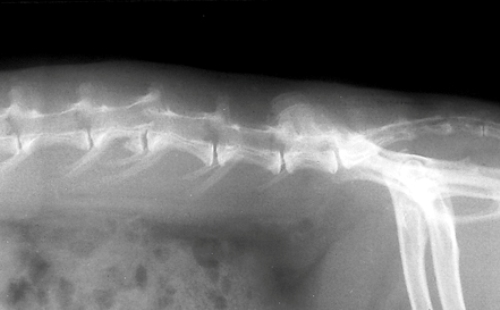Difference between revisions of "Small Mammals Q&A 10"
Jump to navigation
Jump to search
| Line 13: | Line 13: | ||
|q1= What lesion is depicted in the radiograph? | |q1= What lesion is depicted in the radiograph? | ||
|a1= A comminuted fracture is visible in the fourth lumbar vertebrae, resulting in misalignment of the vertebral column caudal to the fracture. | |a1= A comminuted fracture is visible in the fourth lumbar vertebrae, resulting in misalignment of the vertebral column caudal to the fracture. | ||
| − | |l1= | + | |l1= |
|q2= Why is this lesion commonly found in rabbits? | |q2= Why is this lesion commonly found in rabbits? | ||
|a2= Rabbits have extremely powerful rear limbs. If adequate control of the rear limbs is not maintained during restraint, vertebral fractures or luxations can occur if the rabbit kicks and hyperextends the spine. | |a2= Rabbits have extremely powerful rear limbs. If adequate control of the rear limbs is not maintained during restraint, vertebral fractures or luxations can occur if the rabbit kicks and hyperextends the spine. | ||
| − | |l2= | + | |l2= |
|q3= What is the prognosis for this rabbit? | |q3= What is the prognosis for this rabbit? | ||
|a3= Poor, especially in cases such as this where alignment of the vertebral column is not maintained. | |a3= Poor, especially in cases such as this where alignment of the vertebral column is not maintained. | ||
Routinely euthanasing all rabbits with spinal fractures is not recommended as some rabbits can exhibit improvement weeks to months later with supportive care including cage rest and anti-inflammatory drugs. Each case should be individually evaluated. | Routinely euthanasing all rabbits with spinal fractures is not recommended as some rabbits can exhibit improvement weeks to months later with supportive care including cage rest and anti-inflammatory drugs. Each case should be individually evaluated. | ||
| − | |l3= | + | |l3= |
| + | |q4= | ||
| + | |a4= | ||
| + | |l4= | ||
</FlashCard> | </FlashCard> | ||
| Line 27: | Line 30: | ||
desc none}} | desc none}} | ||
[[Category: Small Mammals Q&A]] | [[Category: Small Mammals Q&A]] | ||
| + | [[Category:To Do - Manson]] | ||
Revision as of 12:47, 16 August 2011
| This question was provided by Manson Publishing as part of the OVAL Project. See more Small Mammals questions |
A three-year-old rabbit is acutely paralyzed in the rear limbs. The paralysis occurred after the rabbit was handled by several small children. The patient is alert and responsive, with normal mentation and normal appetite. The front limbs have no neurological abnormalities; the rear limbs are bilaterally hyporeflexive, and show no evidence of voluntary motion. The spinal radiograph above was taken.
| Question | Answer | Article | |
| What lesion is depicted in the radiograph? | A comminuted fracture is visible in the fourth lumbar vertebrae, resulting in misalignment of the vertebral column caudal to the fracture.
|
[[|Link to Article]] | |
| Why is this lesion commonly found in rabbits? | Rabbits have extremely powerful rear limbs. If adequate control of the rear limbs is not maintained during restraint, vertebral fractures or luxations can occur if the rabbit kicks and hyperextends the spine.
|
[[|Link to Article]] | |
| What is the prognosis for this rabbit? | Poor, especially in cases such as this where alignment of the vertebral column is not maintained.
Routinely euthanasing all rabbits with spinal fractures is not recommended as some rabbits can exhibit improvement weeks to months later with supportive care including cage rest and anti-inflammatory drugs. Each case should be individually evaluated. |
[[|Link to Article]] | |
